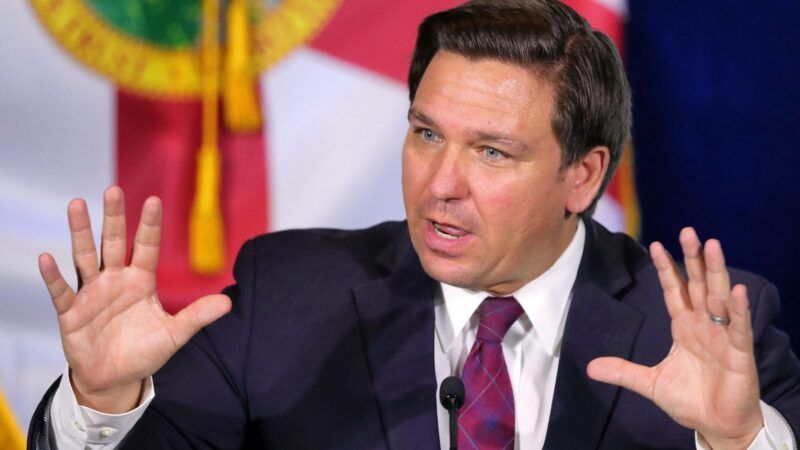Florida Sued by Activists, Students, Parents, and Teachers Over LGBT School Censorship Bill
The vague wording of the bill has led to a culture war fight about what the text means, and that’s never good for the First Amendment.

Activist organizations and families affected by Florida's bill restricting discussions on LGBT issues in public schools have filed suit to stop it, arguing that it violates the First and 14th Amendment rights of students, parents, and teachers in the state.
H.B. 1557, known by its opponents as the "Don't Say Gay" bill, was passed by Florida's Legislature earlier in the year and signed into law by Republican Gov. Ron DeSantis in March. The bill's supporters insist that its purpose is to stop inappropriate discussions of sex and gender in front of young school children from kindergarten through third grade.
But that's not what the law actually says—it instead bans discussion about "sexual orientation or gender identity" in those grades, not sex. It further bans any discussion about topics that are not "age-appropriate or developmentally appropriate for students" without identifying what any of that means. It also allows parents of students to take schools to court and seek financial damages for violations of this very vaguely written law.
Nonprofit group Equality Florida filed suit Thursday in the U.S. District Court of the Northern District of Florida, joined by some gay and trans students in Florida schools, several gay couples with children in public schools, and a teacher.
The lawsuit describes H.B. 1557 as a bill that does not, in fact, stop overly vivid discussions of sex with children but instead attempts to censor speech about LGBT issues, sexual or not:
It offends principles of free speech and equal protection by seeking to censor discussions of sexual orientation or gender identity that recognize and respect LGBTQ people and their families. It offends due process by using broad and vague terms to define its prohibitions—thus inviting discriminatory enforcement and magnifying its chilling effect on speech. And it arises from discriminatory purposes and outdated sex-based stereotypes that offend deeply rooted constitutional and statutory requirements.
The lawsuit explains what people mean when they call it the "Don't Say Gay" bill, even though the text of the bill doesn't technically forbid saying "gay." The bill authorizes families to sue over violations of terms that are never defined by the bill:
H.B. 1557 recruits every parent as a roving censor, armed with a legal warrant to sue schools for damages whenever they believe a teacher, a student, or any "third party" has provided any "classroom instruction" that may be perceived as relating to "sexual orientation" or "gender identity." The potential for arbitrary and discriminatory enforcement here is self-evident—and it reflects a choice designed to maximize the law's in terrorem (threatening) effects. H.B. 1557 thus operates in a manner antithetical to reasonable requirements of an age or developmentally appropriate education, instead creating a scheme in which parents can use the threat of litigation over vague statutory terms to menace school boards and intimidate teachers into offering a skewed, discriminatory curriculum.
The lawsuit lists a bunch of potential discussions of LGBT issues that aren't inherently about sex or gender identity and questions whether they run afoul of the law. "Can a student of two gay parents talk about their family during a class debate about civics? Can that student paint a family portrait in art class? Can a lesbian student refer to their own coming out experience while responding to a work of literature? Can a transgender student talk about their gender identity while studying civil rights in history class?"
If you believe people who say that H.B. 1557 is about stopping only sexual discussions around children, you might think that the answer to these questions would be "yes." But that's not what the bill actually says, and this lawsuit is intended to highlight that fundamental flaw. In fact, when one lawmaker attempted to amend the bill to make the language more explicitly about prohibiting discussion of "human sexuality or sexual activity," he was shot down.
The lawsuit lists six counts of potential First and 14th Amendment violations. Plaintiffs argue that the law should be considered "void for vagueness," a judicial principle that requires that laws (particularly criminal laws or laws that have penalties like this one) have clear definitions of their prohibitions. In this case, because all the terms go undefined and the "state standards" the bill refers to do not yet exist, the plaintiffs argue that they are uncertain about what they can legally discuss without violating H.B. 1557.
The lawsuit further claims that the bill violates the Equal Protection Clause of the 14th Amendment by targeting LGBT people and treating them differently from other people. (Under the text of the bill, a teacher could quite vividly discuss sexual behavior with school children as long as it's heterosexual behavior.) They argue the law violates the First Amendment rights of students to receive information for reasons unrelated to pedagogical concerns and by creating a chilling effect that censors speech.
The lawsuit asks the court to stop Florida from implementing and enforcing H.B. 1557.
As a reminder, the last big bill Florida passed out of political spite, S.B. 7072, their "anti-Big Tech" bill that attempts to wrest control away from social media platforms, has been blocked by a federal judge for violating the First Amendment rights of the social media companies. The judge further warned that several of the bill's provisions were "especially vague," an issue because the bill also threatened massive fines. Don't be surprised if the exact same thing happens here.


Show Comments (197)